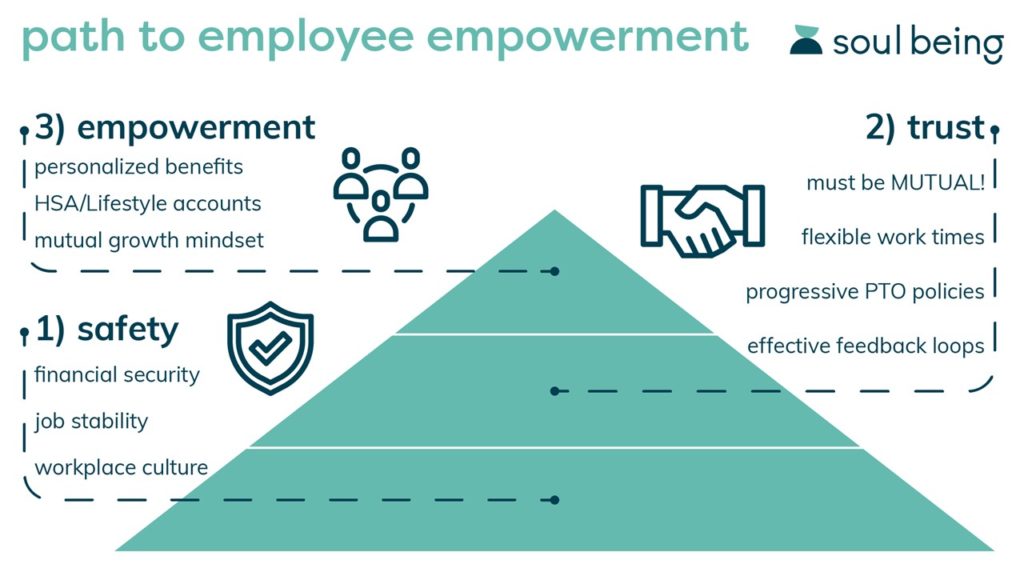What makes a company a destination workplace? This is the question that many HR professionals find themselves coming back to again and again this year, as the battle for talent goes global and is more competitive than ever.
Employee engagement is a critical KPI. With a national benchmark of only 20% engagement, the bar seems very low. And yet most employers are overlooking the importance of this metric as a direct driver to financial sustainability. “Employee engagement can lead to 21% greater productivity, 59% lower employee turnover and 41% less absenteeism.” Says Marcus Wennmo, CEO of Eletive. “This is why increasing employee engagement is often the most efficient way to reduce costs (employee turnover, sick absence and low productivity) and increase profit (happier customers, healthier employees, more innovation and higher retention).”
At SoulBeing, what we have been hearing lately is that what people need from their employers is not necessarily tangible in the way employers are used to supporting their teams. Employees are asking for a feeling of support. They are asking for compassion, empathy, flexibility, and connection. They need these things to feel engaged and empowered to bring their best selves to work. But how do employers demonstrate these things to their employees?

Through culture. Just like Maslow’s Hierarchy of Needs, employees move up levels of the Employee Empowerment Pyramid once needs are met. Foundationally, employees feel safe at work through financial stability, job security, and psychological safety in a workplace that is fair, equitable and rooted in respect. When these needs are met, they are free to develop mutual trust with their employer. Trust is able to be established through policies aligned with employee feedback and through leadership that “walks the talk.” Integrity is the backbone of developing trust in the workplace.
Once trust is established, empowerment is possible. Reaching this level of employee engagement and satisfaction is essential to recruiting and retaining top talent, and yet we know that less than 20% of workplaces are reaching this level of cultural effectiveness. Empowerment comes only for those organizations who have first established solid safety and trust with their employees, then prioritize investments of time and resources into empowering employees to be their best selves.
“In order for a company to become the best version of itself, it must help its employees become the best versions of themselves,” says Dr. Jayne Gardner, PhD, MCC, LPC. That is the purpose of employee empowerment.
If culture is the vehicle here, how can an employer create and promote the type of empowered culture that employees are actively seeking? Excitingly, the answer we have found time and time again to this question is: through benefits! In fact, a 2021 joint study by Maven and Best Workplaces for Parents, 4 out of 5 working parents indicated that a more holistic approach to employee wellbeing could prevent them from quitting their jobs.
But this doesn’t just impact attraction and retention. There are huge downstream effects on productivity, job satisfaction, absenteeism and presenteeism as well. Right now, so many employees are just coping. This makes sense, since we know that the effects of PTSD do not set in until 6-18 months after an event has concluded, which puts us squarely in the timeframe of post-pandemic PTSD symptom onset. The problem will get worse before it gets better, with the majority of working parents sharing that they feel “more stressed” in 2022 than they did in 2020-2021, even at the height of pandemic uncertainty and strain.
With much of our workforce in survival mode, and our workplaces struggling to keep employees engaged in their work, the opportunity time to help your employees thrive by empowering them to take care of their whole health, including the health of their family members.
Dr. Gardner concludes that “if your employees are unhappy, they will also be unproductive. That’s why businesses with cultures that make employees feel valued are usually among the most profitable.” The message is clear: investing in strategies that boost company culture and promote employee empowerment will pay off both tangibly and intangibly, directly and indirectly on a company’s bottom line.
Questions about this article? I’d love to hear from you!
Colleen
Sources:
The 4 Steps to Building a Workplace Where People Thrive, Marcus Wennmo, Eletive
How to Create An Employee Focused Culture that Pays Off, Jayne Gardner, PhD, MCC, LPC





0 Comments